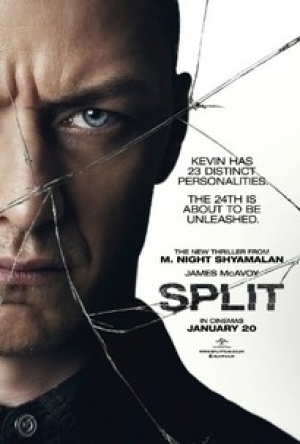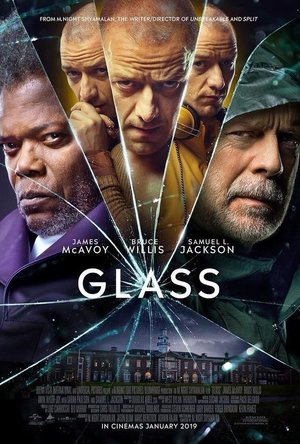Search

Split (2016)
Movie Watch
Though a man named Kevin has evidenced 23 personalities to his trusted psychiatrist, Dr. Fletcher,...
Split Psychological thriller
Bob Mann (459 KP) rated Split (2016) in Movies
Sep 29, 2021
“We are what we believe we are”.
M. Night Shyamalan fizzed into movie consciousness in 1999 with “The Sixth Sense” which – having rewatched it again recently – still has the power to unnerve and impress even after knowing the famous ‘twist’. Since that film and his next, “Unbreakable” in 2000, Shyamalan has ‘done a bit of an Orson Welles’ by never really living up to that early promise. Here with “Split” he returns to better form with a psychological thriller that is heavy on the psycho.
James McAvoy plays Kevin… and Dennis, and Patricia, and Hedwig, and Barry, and Orwell, and Jade, and… if the running time permitted… another 17 characters. But this is no “Kind Hearts and Coronets”: McAvoy plays all these varied personalities in the same body. For Kevin suffers from Multiple Personality Disorder, a rare condition where his different schisms not only affect his speech and attitude but also his whole physique. One personality for example is diabetic and needs insulin: all his others are fine.
Under the care of MPD specialist Dr Karen Fletcher (Betty Buckley, “Carrie”), Kevin seems to be making good progress. But all is not as it seems. Dennis, one of the more evil of Kevin’s personalities, has kidnapped three teens – Claire (Haley Lu Richardson), Marcia (Jessica Sula) and Casey (Anya Taylor-Joy) – and is holding them captive in his home.
It’s all going so well. Kevin (James McAvoy) getting much needed treatment from Dr Fletcher (Betty Buckley).
While Claire and Marcia are good friends, Casey is the wild-card in the pack: a moody and aloof teen that doesn’t fit in with the crowd. We see the abduction unfold largely through her intelligent and analytical eyes, with her experiences causing flashbacks to hunting trips in the woods as a five-year-old child with her father and uncle.
This is McAvoy’s film, with his different personalities being very well observed and the scenes where he switches from one to the other being particularly impressive as piece of acting. Of the youngsters, Anya Taylor-Joy is the most impressive, with the denouement of her particular sub-plot being my favourite part of the film.
Shyamalan, who also wrote the script, is treading a well worn cinematic path here (since often the MPD element is the surprise twist, to list any films here inevitably risks major spoilers – – but there is a decent list here). But this is a film that seems to have generated a lot of interest, particularly with a younger audience (I have seldom been quizzed more with the “Ooh, have you seen this yet” question). As a result this may be a modest sleeper hit.
Girl pray or Girl prey? Casey deep in the psycho’s lair.
Where I think the movie missteps is in its casting of the three cute and scantily dressed teens as the abductees. From the plot of the film that emerges this appears to be unnecessary and exploitative, especially since they are made to progressively dis-robe as the film progresses. The film would actually have been made more interesting if a family unit, or at least a mixed variety of individuals, had been taken.
Marcia (Jessica Sula) doesn’t necessarily appreciate the floral gift.
Unfortunately Shyamalan also over-gilds the lily for the finale by going from medical improbability into outright science fiction: and dilutes what was up to that point a stylish thriller. As a result it’s a decent popcorn film, and worth seeing for McAvoy’s clever performance, but its not going to go down in my book as a classic.
Watch out by the way for a nice final cameo scene: a clever reference to past glories.
James McAvoy plays Kevin… and Dennis, and Patricia, and Hedwig, and Barry, and Orwell, and Jade, and… if the running time permitted… another 17 characters. But this is no “Kind Hearts and Coronets”: McAvoy plays all these varied personalities in the same body. For Kevin suffers from Multiple Personality Disorder, a rare condition where his different schisms not only affect his speech and attitude but also his whole physique. One personality for example is diabetic and needs insulin: all his others are fine.
Under the care of MPD specialist Dr Karen Fletcher (Betty Buckley, “Carrie”), Kevin seems to be making good progress. But all is not as it seems. Dennis, one of the more evil of Kevin’s personalities, has kidnapped three teens – Claire (Haley Lu Richardson), Marcia (Jessica Sula) and Casey (Anya Taylor-Joy) – and is holding them captive in his home.
It’s all going so well. Kevin (James McAvoy) getting much needed treatment from Dr Fletcher (Betty Buckley).
While Claire and Marcia are good friends, Casey is the wild-card in the pack: a moody and aloof teen that doesn’t fit in with the crowd. We see the abduction unfold largely through her intelligent and analytical eyes, with her experiences causing flashbacks to hunting trips in the woods as a five-year-old child with her father and uncle.
This is McAvoy’s film, with his different personalities being very well observed and the scenes where he switches from one to the other being particularly impressive as piece of acting. Of the youngsters, Anya Taylor-Joy is the most impressive, with the denouement of her particular sub-plot being my favourite part of the film.
Shyamalan, who also wrote the script, is treading a well worn cinematic path here (since often the MPD element is the surprise twist, to list any films here inevitably risks major spoilers – – but there is a decent list here). But this is a film that seems to have generated a lot of interest, particularly with a younger audience (I have seldom been quizzed more with the “Ooh, have you seen this yet” question). As a result this may be a modest sleeper hit.
Girl pray or Girl prey? Casey deep in the psycho’s lair.
Where I think the movie missteps is in its casting of the three cute and scantily dressed teens as the abductees. From the plot of the film that emerges this appears to be unnecessary and exploitative, especially since they are made to progressively dis-robe as the film progresses. The film would actually have been made more interesting if a family unit, or at least a mixed variety of individuals, had been taken.
Marcia (Jessica Sula) doesn’t necessarily appreciate the floral gift.
Unfortunately Shyamalan also over-gilds the lily for the finale by going from medical improbability into outright science fiction: and dilutes what was up to that point a stylish thriller. As a result it’s a decent popcorn film, and worth seeing for McAvoy’s clever performance, but its not going to go down in my book as a classic.
Watch out by the way for a nice final cameo scene: a clever reference to past glories.
Daniel Boyd (1066 KP) rated Glass (2019) in Movies
Feb 1, 2019 (Updated Feb 1, 2019)
First 2 acts are interesting (1 more)
MacAvoy is great
A Textbook Example On How Not To End A Trilogy
Contains spoilers, click to show
Glass is the 3rd movie in M. Night Shyamalan's pseudo superhero trilogy following Unbreakable and Split. Unfortunately it is probably the worst movie out of the three and doesn't live up to the twenty years of build-up it has had going into it. Full spoilers will be present through this review as it's kind of hard to discuss the film without spoiling anything.
The movie opens with what is essentially a condensed version of both Unbreakable and Split. We see Bruce Willis' Dennis Dunn stalking criminals in his poncho and we see James MacAvoy's Kevin Wendell Crumb keeping four young girls captured in an abandoned warehouse. The old 'unstoppable force meets immovable object,' trope plays out and the two of them wind up getting caught by Sarah Paulson and her team, who apparently specialise in investigating those who have delusions about having superhuman powers.
She brings the two of them to a mental hospital where she is keeping Samuel L Jackson's Mr Glass. Sarah Paulson's character then spends the next chunk of the movie trying to convince the three that the powers that they believe they possess is actually in their heads and there is a real-world, logical explanation to everything that they can do. This part of the film is actually pretty interesting in the ideas that it poses and I liked where the film was going at this point.
Then the third act happens and we are reminded why Shyamalan so desperately needs an editor to keep his ideas in check. There is this huge build up that takes place teasing an epic fight between Dunn and The Beast at the top of some huge brand new building in the middle of the city. Unfortunately we never get there and instead we just get some mediocre action choreography in a medium sized car park between the two. The whole thing ends with the fairly contrived retcon twist that Kevin's dad was in the same train crash that Dunn survived and Mr Glass caused, thus making Mr Glass the 'creator,' of both superheroes. Then the three characters die in an extremely anticlimactic fashion. The Beast breaks a couple of Mr Glass' bones and he falls out of his wheelchair and dies, (even though this is something that we have seen happen to him in Unbreakable and he survived it.) Then a sniper randomly shoots Kevin even though the beast is tamed by the appearance of Anya Taylor-Joy's character, Casey from Split. He just gets shot once and dies with hardly any fanfare. Then David Dunn is drowned in a puddle as Sarah Paulson explains that she is part of a secret organisation that hunts people who believe that they are superheroes, determines whether or not they really are superheroes through a pretty drawn-out process and then proceeds to kill them if they do in fact possess superpowers. We also see that for some reason this group apparently only meets in crowded public restaurants in the middle of the city centre in broad daylight and have to wait until any non members of this super secret club, (that just killed 3 people in a public car park in broad daylight in front of cops and family members,) have left the restaurant before they can discuss business. Then it turns out that Mr Glass leaked the footage from the hospital security cameras online so that people would see that superheroes really do exist.
If you are someone that hasn't seen the movie and doesn't care about spoilers so you just read this review anyway; your brain is probably falling out of your ear after reading my description of the third act and that's because on paper this whole sequence of events is absolutely ludicrous and the fact that no one pointed this out during the movie's production is mind-boggling.
What a waste after two solid movies and a decent two first acts worth of build up...
There are some positives I took away though. It is as much of an absolute joy to watch James MacAvoy play so many totally different characters convincingly in one scene as it was in Split, maybe even more so here as we get to see even more personalities emerge and in even quicker succession. He is an utterly phenomenal actor. It is also cool to see Mr Glass and David Dunn after twenty years to see where they are at in their lives and how they have been spending their time since the events of Unbreakable. There are also some nice shots and camera angles in the film, (more so in the first two acts of the story,) and some nice colour scheme aesthetics going on in certain compositions that made some shots more interesting to look at.
Overall, this movie could have been so much more and in the end it throws away some really potentially interesting plot threads in favour for a few tacked on twists and gives us nothing more than a half arsed conclusion to an otherwise solid trilogy.
The movie opens with what is essentially a condensed version of both Unbreakable and Split. We see Bruce Willis' Dennis Dunn stalking criminals in his poncho and we see James MacAvoy's Kevin Wendell Crumb keeping four young girls captured in an abandoned warehouse. The old 'unstoppable force meets immovable object,' trope plays out and the two of them wind up getting caught by Sarah Paulson and her team, who apparently specialise in investigating those who have delusions about having superhuman powers.
She brings the two of them to a mental hospital where she is keeping Samuel L Jackson's Mr Glass. Sarah Paulson's character then spends the next chunk of the movie trying to convince the three that the powers that they believe they possess is actually in their heads and there is a real-world, logical explanation to everything that they can do. This part of the film is actually pretty interesting in the ideas that it poses and I liked where the film was going at this point.
Then the third act happens and we are reminded why Shyamalan so desperately needs an editor to keep his ideas in check. There is this huge build up that takes place teasing an epic fight between Dunn and The Beast at the top of some huge brand new building in the middle of the city. Unfortunately we never get there and instead we just get some mediocre action choreography in a medium sized car park between the two. The whole thing ends with the fairly contrived retcon twist that Kevin's dad was in the same train crash that Dunn survived and Mr Glass caused, thus making Mr Glass the 'creator,' of both superheroes. Then the three characters die in an extremely anticlimactic fashion. The Beast breaks a couple of Mr Glass' bones and he falls out of his wheelchair and dies, (even though this is something that we have seen happen to him in Unbreakable and he survived it.) Then a sniper randomly shoots Kevin even though the beast is tamed by the appearance of Anya Taylor-Joy's character, Casey from Split. He just gets shot once and dies with hardly any fanfare. Then David Dunn is drowned in a puddle as Sarah Paulson explains that she is part of a secret organisation that hunts people who believe that they are superheroes, determines whether or not they really are superheroes through a pretty drawn-out process and then proceeds to kill them if they do in fact possess superpowers. We also see that for some reason this group apparently only meets in crowded public restaurants in the middle of the city centre in broad daylight and have to wait until any non members of this super secret club, (that just killed 3 people in a public car park in broad daylight in front of cops and family members,) have left the restaurant before they can discuss business. Then it turns out that Mr Glass leaked the footage from the hospital security cameras online so that people would see that superheroes really do exist.
If you are someone that hasn't seen the movie and doesn't care about spoilers so you just read this review anyway; your brain is probably falling out of your ear after reading my description of the third act and that's because on paper this whole sequence of events is absolutely ludicrous and the fact that no one pointed this out during the movie's production is mind-boggling.
What a waste after two solid movies and a decent two first acts worth of build up...
There are some positives I took away though. It is as much of an absolute joy to watch James MacAvoy play so many totally different characters convincingly in one scene as it was in Split, maybe even more so here as we get to see even more personalities emerge and in even quicker succession. He is an utterly phenomenal actor. It is also cool to see Mr Glass and David Dunn after twenty years to see where they are at in their lives and how they have been spending their time since the events of Unbreakable. There are also some nice shots and camera angles in the film, (more so in the first two acts of the story,) and some nice colour scheme aesthetics going on in certain compositions that made some shots more interesting to look at.
Overall, this movie could have been so much more and in the end it throws away some really potentially interesting plot threads in favour for a few tacked on twists and gives us nothing more than a half arsed conclusion to an otherwise solid trilogy.


